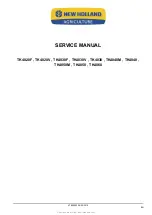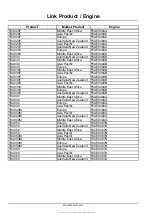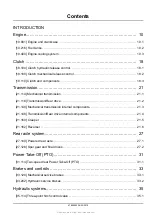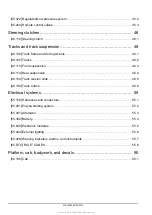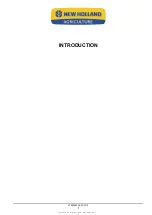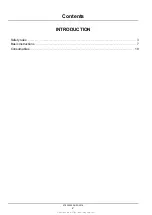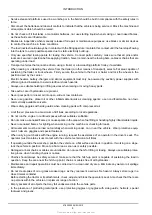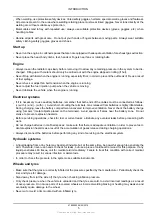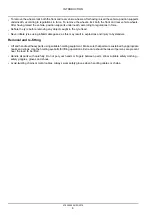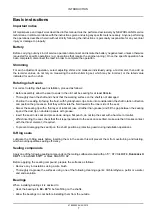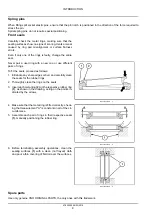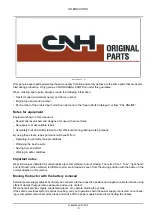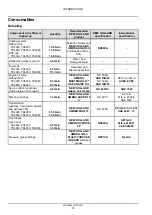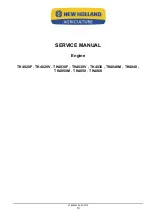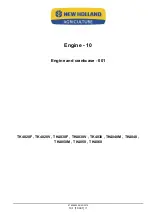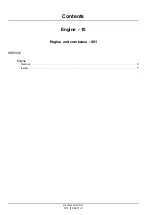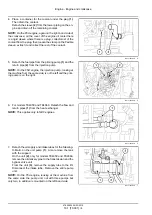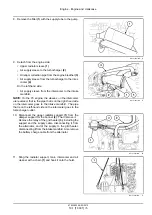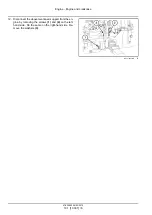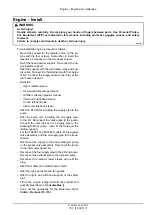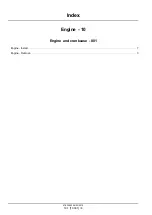
INTRODUCTION
• When welding, use protective safety devices: tinted safety goggles, helmets, special overalls, gloves and footwear.
All persons present in the area where welding is taking place must wear tinted goggles. Never look directly at the
welding arc without suitable eye protection.
• Metal cables tend to fray with repeated use: always use suitable protective devices (gloves, goggles, etc.) when
handling cables.
• Handle all parts with great care. Do not put your hands or fingers between moving parts. Always wear suitable
safety clothing-safety goggles, gloves and shoes.
Start up
• Never run the engine in confined spaces that are not equipped with adequate ventilation for exhaust gas extraction.
• Never place the head, body, limbs, feet, hands or fingers near fans or rotating belts.
Engine
• Always loosen the radiator cap slowly before removing it to allow any remaining pressure in the system to be dis-
charged. Filling up with coolant should only be carried out with the engine stopped or idling (if hot).
• Never fill up with fuel when the engine is running, especially if hot, in order to prevent the outbreak of fire as a result
of fuel spillage.
• Never check or adjust fan belt tension when the engine is running.
Never adjust the fuel injection pump when the vehicle is moving.
• Never lubricate the vehicle when the engine is running.
Electrical systems
• If it is necessary to use auxiliary batteries, remember that both ends of the cables must be connected as follows:
(+) with (+) and (−) with (−). Avoid short-circuiting the terminals. Gas released from batteries is highly inflammable.
During charging, leave the battery compartment uncovered to improve ventilation. Never check the battery charge
using “jumpers” (metal objects placed on the terminals). Avoid sparks or flames near the battery zone. Do not
smoke to prevent explosion hazards.
• Before servicing operations, check for fuel or current leaks: eliminate any eventual leaks before proceeding with
work.
• Do not charge batteries in confined spaces: make sure that there is adequate ventilation in order to prevent acci-
dental explosion hazards as a result of the accumulation of gases released during charging operations.
• Always disconnect the batteries before performing any kind of servicing on the electrical system.
Hydraulic systems
• A liquid leaking from a tiny hole may be almost invisible but, at the same time, be powerful enough to penetrate the
skin. Therefore, never use hands to check for leaks, but use a piece of cardboard or wood for this purpose. If any
liquid penetrates skin tissue, call for medical aid immediately. Failure to treat this condition with correct medical
procedure may result in serious infection or dermatosis.
• In order to check the pressure in the system use suitable instruments.
Wheels and tyres
• Make sure that the tyres are correctly inflated at the pressure specified by the manufacturer. Periodically check the
rims and tyres for damage.
• Stand away from (at the side of) the tyre when checking inflation pressure.
• Only check pressure when the vehicle is unloaded and the tyres are cold, to avoid incorrect readings as a result
of over-pressure. Do not use parts of recovered wheels as incorrect welding brazing or heating may weaken and
eventually cause damage to the wheel.
• Never cut or weld a rim mounted with an inflated tyre.
47830952 26/03/2015
5
Find manuals at https://best-manuals.com
Содержание TK4020F
Страница 6: ...INTRODUCTION 47830952 26 03 2015 1 Find manuals at https best manuals com ...
Страница 25: ...Index Engine 10 Engine and crankcase 001 Engine Install 7 Engine Remove 3 47830952 26 03 2015 10 1 10 001 8 ...
Страница 41: ...This as a preview PDF file from best manuals com Download full PDF manual at best manuals com ...


